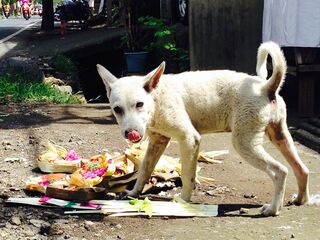Marco Adda is an independent scholar, anthrozoologist, and expert on the behavior of dogs, focusing on free-ranging ones living in Bali. He also is an eclectic scholar and his recent essay, "Recognising Anthrozooalgia on the Way to the Symbiocene" is a future-looking, thought-provoking piece that weaves together different views of where we are now—living in the Anthropocene (a time that rightly can be called "the rage of inhumanity" rather than "the age of humanity") and the Anthropause, how we got here, and where we're going.
The word "anthropause" was coined in an essay by Christian Rutz and his colleagues called "COVID-19 lockdown allows researchers to quantify the effects of human activity on wildlife."1 It refers to "a considerable global slowing of modern human activities, notably travel." New Scientist writer Graham Lawton notes that when humans were confined because of COVID-19, we had a unique chance to see how human activity affects wildlife. It also affected us.

Adda's piece is available online, so here are a few snippets to whet your appetite for more. The ways in which he weaves together different topics, ranging from human behavior before the lockdown, anthropocene psychology, to behavior during the Anthropause, to deep concern for dogs and other animals that often results in human suffering "anthrozooalgia," to the ways in which dogs mirror our thoughts and feelings, to how we can all work together to make the better place for all animals, human and nonhuman—topics that at first glance seem to be unrelated, is remarkably novel and important.
Adda notes:
- During the lockdown in 2020, vegetation and wildlife thrived.
-
The recent pandemic and the Anthropause allowed humans to experiment with how the world would be if human activities stopped.
-
The Anthropause fosters the imagination of a world without humans. It may turn into a thoughtful speculative biology and evolution exercise.2
-
Glenn Albrecht argues that the next era in human history might be the Symbiocene—living together for a common benefit (humans and the environment) and fostering hope for a better period of Earth’s history.The Symbiocene is a meme that invites all humans to create a future where positive Earth emotions will prevail over the negative.3
-
Anthrozooalgia contributes to the advancement of the Symbiocene. It increases attention to humans’ empathy for animals. Humans reconsider their presence in the world and reframe the species as part of a whole, not as a supremacist force over others.
-
Dogs are the perpetual mirror for human behavior. Dogs accompanied humans for thousands of years, throughout what is known as domestication, and have been involved in various ways in human life and rituals, The more humans have experienced stress in the last century, the more they have looked at companion dogs as a possible form of support.
-
The sudden increase in dog adoptions—among the benefits provided to both dogs and people, also paved the way for some forms of Anthrozooalgia. While domestic violence has increased among people, violence and abuse of dogs have also increased.
-
Dogs did not have enough time for themselves during lockdown due to the continuous presence of their human family members and over-solicitation.
-
As the freedom of dogs diminished (by law), and that of cats as well (by practice), the intensity of the relationship between humans and pets grew. The numbers of dogs and cats rose, and more of them now lived within the private space of homes. Dogs and cats became more important to humans, even as humans became more important to dogs and cats.
Humans are guests of planet Earth
Adda rightfully concludes that the global lockdown and the Anthropause are an existential crisis: the disconnection of humans from the environment, from animals, and themselves as a whole species. The disconnection is counterbalanced by deep concern, which also causes several forms of collective suffering. One solution is for all of us to rewild ourselves, rewild hope, remain positive, and deeply reconnect with all beings, human and nonhuman, on our magnificent and wondrous, but wounded and finitely resilient planet.
Science and common sense warn that we can't go on living as we do. Even as an optimist's optimist, I (and others) know there is no way that will work or be sustainable. We continue to leave wakes of destruction that at some point will be irreversible. We are, as Warren Hern aptly puts it, Homo Ecophagus, a species that devours ecosystems.
I highly recommend Ada's essay. I work on many of these issues daily, sometimes hourly, and each time I go back to his piece I marvel at how different disciplines—ranging from evolutionary biology to animal behavior to conservation psychology, ecopsychology, sociology, and law, to name some of them—are tightly woven together and how each, on its own and especially in combination with others, can help us make our way through difficult times and work together, globally, for better futures for all of humankind and non-human animals.
Nothing could be better for all of Earth's terrestrial, airborne, and aquatic residents. We're all interconnected in fascinating, myriad ways, many of which remain mysterious and might forever be so.
Nonetheless, we never should stop trying to learn about what is happening for everyone and striving for global coexistence, including with Earth's spectacular flora which also deserve to survive and are essential for our own and other animals' well-being.4
"behavior" - Google News
November 19, 2022 at 05:42AM
https://ift.tt/mbZCWMB
Anthropocene Psychology: Dogs as Mirrors of Human Behavior - Psychology Today
"behavior" - Google News
https://ift.tt/raj2Rel
Bagikan Berita Ini














0 Response to "Anthropocene Psychology: Dogs as Mirrors of Human Behavior - Psychology Today"
Post a Comment